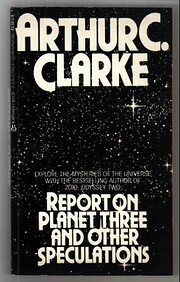

Klik på en miniature for at gå til Google Books
|
Indlæser... Report on Planet Three and Other Speculations (original 1972; udgave 1985)af Arthur C. Clarke
Work InformationReport on Planet Three and Other Speculations af Arthur C. Clarke (1972)

Der er ingen diskussionstråde på Snak om denne bog. A collection of essays on various scientific topics by Arthur C. Clarke, whose skills in this arena are the equal of Asimov's - although the latter's sprightly humor is unbeatable. Clarke manages quite nicely with his droll, dry delivery though. Many of these essays were written in the 1950's, and for those he has added postscripts to bring them more up to date. ingen anmeldelser | tilføj en anmeldelse
Tilhører Forlagsserien
No library descriptions found. |
Current DiscussionsIngenPopulære omslag
 Google Books — Indlæser... Google Books — Indlæser...GenrerNo genres Melvil Decimal System (DDC)629.4Technology Engineering and allied operations Other Branches Astronauts and Space TravelLC-klassificeringVurderingGennemsnit: (3.46) (3.46)
Er det dig?Bliv LibraryThing-forfatter. |
|||||||||||||||||||||||||||||||||||||||||||||||||||||||||||||||||||||||||||||||||||||||||||||||||||||||||||||||||||||
It means that, even in an old book like this one, with the five decades since its publication lining up to demand it show its age, we can still be thrilled at the world that opens up in Clarke's collected essays and articles. Clarke shows us things from new perspectives, such as the comparison between the realms of space and sea in 'Across the Sea of Stars', or even a mere left-field analogy like the Amish one on page 144. He discusses things which still seem prescient, like the discussion of A.I. – even A.I. art! – and universal basic income in 'The Mind of the Machine', and generates discussions on things you might not have ever conceived of asking (as in 'The Star of the Magi', where Clarke contemplates whether the star which led the three kings to Bethlehem was in fact a supernova event).
The imagination and eagerness Clarke shows is boundless, particularly in essays like the titular 'Report on Planet Three'. This is one of a few essays in the book which could also be classified as fiction, for they are written from the perspective of, for example, a society hundred years hence reporting on the history of colonization of the Moon, or, in the titular essay's case, a Martian counterpart to Clarke. 'Report on Planet Three' is written in the style of our own scientific speculations, wondering whether there is life on Earth, the next planet over. The Martian Clarke's report on the strange phenomenon of fire, a violent chemical reaction that Martians can only recreate in the laboratory (pg. 16), shows us how strange our own world is, that we accept this energetic plasma as one of our most ordinary things. Like all the best science writing, Clarke's essays not only dazzle but lead us to ponder some of the things we take for granted, and provide a different perspective on our own world.
It's fantastic to immerse yourself in, though there is also a further effect which Clarke's writing has on the reader nowadays, one which he could not have expected and which he would not have wanted. We see him writing – believably – of the things that will be implemented in the years following the Moon landing, including the first landing on Mars and the first child born in space. There is an infectious optimism here – "a massive thrust forward into a new realm of opportunity, of experience, and of promise" (pg. 125) – and it's with a pang that the reader reads Arthur C. Clarke in 2023, knowing we've fallen far, far short. But Clarke's was not a blind optimism; as his most famous work speculates, 2001 was meant to see the establishment of a moon base, and it seemed entirely feasible – maybe even a little conservative.
Clarke grew up in the embryonic years of flight and the birth of quantum mechanics, saw the use of both developments combined over the skies of Hiroshima and, by the end of the 1972 volume reviewed here, was on first-name terms with men who had landed on the Moon. And throughout it all he was a dependable guide, not only explaining what was happening in terms we could understand, but inspiring us to reach even further. Instead, and with deep shame, we can read Report on Planet Three in the current year and, barring one or two theoretical or experimental breakthroughs, it would not require much updating. When Clarke writes of the moon bases that are to come, the space travel and the Martian colonies, he was looking to the future – our time. But when we look back, to the can-do attitude of those Mercury and Apollo pioneers, to people talking of space stations and colonies without irony or fear of cynical laughter – even when Clarke writes of his own time, I noted the clean Manhattan with "courteous" New Yorkers and "spotless subway stations" (pg. 246) – we are looking back on a lost world. What we would give to be able to bottle that and release it again today. We'll have to make do with the fading echoes of it provided by books like Report on Planet Three. (